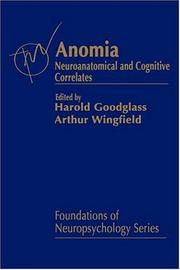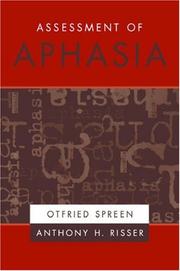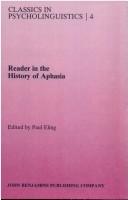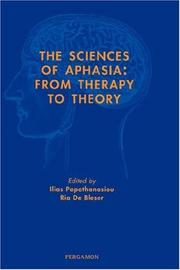| Listing 1 - 10 of 58 | << page >> |
Sort by
|
Book
ISBN: 0429910363 0429896131 042947136X 1282900307 9786612900303 1849400989 Year: 1990 Publisher: London : London ; New York : New York, N.Y. : Institute of Psycho-Analysis ; Karnac Books ; Distributed in the United States of America by Brunner/Mazel,
Abstract | Keywords | Export | Availability | Bookmark
 Loading...
Loading...Choose an application
- Reference Manager
- EndNote
- RefWorks (Direct export to RefWorks)
"Translations of two neuroscientific articles by Freud are presented here for the first time in English. Alongside these, the editors offer convincing arguments for their importance to both psychoanalysis and neuroscience. These articles helped provide the catalyst for the modern activity in the field, and will prove fascinating to anyone interested in the origins of this bold new movement. Between 1877 and 1900, Sigmund Freud published over one hundred neuroscientific works, only seven of which have previously appeared in English translation. Aphasie and Gehirn, the two articles presented in A Moment of Transition, were originally composed in 1888 as dictionary entries for the Handwortebuch der gesamten Medizin edited by Albert Villaret. They therefore date from a pivotal period of Freud's career when a growing interest in psychology had already begun to vie with strictly neurological endeavors; a shift of emphasis reflected in the novel and independent conceptual position adopted in both papers, prefiguring Freud's later work On Aphasia and certain aspects of the Project for a Scientific Psychology. Freud's professional development during this period is revealing. In 1885-86 he had studied under Jean-Martin Charcot in Paris. On his return to Vienna in 1886 he gave papers on hypnotism and hysteria, and made translations of Charcot's most recent lectures. In the following year he adopted Joseph Breuer's 'cathartic method' for the treatment of hysterical patients, and produced two reviews of hysteria and neurasthenia. In 1888 - the year of Aphasie and Gehirn - two further papers on hysteria were published. In the substantial commentary which accompanies the translations, Mark Solms and Michael Saling firstly establish Freud's authorship of the two articles, and then embark upon a critical examination of the literature so far devoted to them. They discuss the potential importance of Aphasie and Gehirn, and present detailed arguments to demonstrate their significance both of the history of psychoanalysis and for the history of neuroscience."--Provided by publisher.
Book
Abstract | Keywords | Export | Availability | Bookmark
 Loading...
Loading...Choose an application
- Reference Manager
- EndNote
- RefWorks (Direct export to RefWorks)
Aphasia is an acquired central disorder of language that impairs a person's ability to understand and/or produce spoken or writing language. The study of aphasia is important in different clinical and fundamental areas, including neurology, psychology, linguistics, and speech-language pathology. This book presents comprehensive information on the diagnosis and treatment of aphasias. Chapters cover such topics as linguistics and the study of aphasias, different types of aphasias, treatment approaches, imaging, and much more.
Aphasia --- Diagnosis.

ISBN: 0122896858 9786611037116 1281037117 0080527272 9780122896859 9780080527277 Year: 1997 Publisher: San Diego : Academic Press,
Abstract | Keywords | Export | Availability | Bookmark
 Loading...
Loading...Choose an application
- Reference Manager
- EndNote
- RefWorks (Direct export to RefWorks)
Anomia is the inability to access spoken names for objects, most often associated with the elderly or those with brain damage to the left hemisphere. Anomia offers the state-of-the-art review of disorders of naming, written by acknowledged experts from around the world, approached from both clinical and theoretical viewpoints. Goodglass, known around the world for his research in aphasia and speech pathology, edits this first book devoted exclusively to naming and its disorders. Wingfield is known for his classic studies of lexical processing in aphasic and normal speakers. The book inc
Anomia. --- Neuropsychiatry. --- Behavioral neurology --- Biological psychiatry --- Neurology --- Amnesiac aphasia --- Amnesic aphasia --- Anomic aphasia --- Dysnomia --- Nominal aphasia --- Amnesia --- Aphasia
Book
ISBN: 1634839943 9781634839938 9781634839945 1634839935 Year: 2016 Publisher: New York : Nova Biomedical,
Abstract | Keywords | Export | Availability | Bookmark
 Loading...
Loading...Choose an application
- Reference Manager
- EndNote
- RefWorks (Direct export to RefWorks)
Aphasia. --- Aphasia --- Brain --- Language disorders --- Speech disorders --- Treatment. --- Diseases
Book
Year: 2022 Publisher: Amsterdam ; Netherlands : Elsevier,
Abstract | Keywords | Export | Availability | Bookmark
 Loading...
Loading...Choose an application
- Reference Manager
- EndNote
- RefWorks (Direct export to RefWorks)
"Aphasia, Volume 185 covers important advances in our understanding of how language is processed in the brain and how lesions or degeneration in the left hemisphere affect language processing. This new release reviews research regarding how language recovers from brain injury, along with new interventions developed to enhance recovery, including language rehabilitation, noninvasive brain stimulation and medications. Sections cover neuroanatomy and neurophysiology of language networks, focus on mechanisms of recovery (and decline) of language, and include chapters on intervention, including recently developed behavioral therapies, brain stimulation, medications, and a review of studies of treatment for both post-stroke aphasia and primary progressive aphasia"--
Organic electronics. --- Electronics --- Electronic polymers. --- Materials. --- Aphasia. --- Aphasia

ISBN: 1280834935 0198032250 9780198032250 9786610834938 6610834938 9780195140750 0195140753 0195140753 0190286342 Year: 2003 Publisher: Oxford ; New York, N.Y. : Oxford University Press,
Abstract | Keywords | Export | Availability | Bookmark
 Loading...
Loading...Choose an application
- Reference Manager
- EndNote
- RefWorks (Direct export to RefWorks)
In this book, Spreen and Risser present a comprehensive, critical review of available methods for the assessment of aphasia and related disorders in adults and children. The book is a thorough and practical resource for speech and language pathologists, neuropsychologists, and their students and trainees.
Aphasia --- Diagnosis. --- #KVHB:Afasie --- Diagnosis

ISBN: 1283328003 9786613328007 9027276684 9789027276681 9027218935 9789027218933 9781283328005 6613328006 Year: 1994 Volume: 4 Publisher: Amsterdam: Benjamins,
Abstract | Keywords | Export | Availability | Bookmark
 Loading...
Loading...Choose an application
- Reference Manager
- EndNote
- RefWorks (Direct export to RefWorks)
The study of language and the brain is heavily dependent on the work of the early aphasiologists, and those wanting to get acquainted with the discipline will come across frequent references to these classic authors. This collection brings together seminal publications by 19th- and 20th-century neurologists concerned with the relationship between language and the brain. In selecting texts the emphasis was on those parts that deal explicitly with the opinion of an author on language processes as revealed by aphasic phenomena. All texts are presented in English (many of them translated for the f
Aphasia --- Brain --- Language disorders --- Speech disorders --- History --- Diseases --- Aphasie --- Sources --- Histoire --- Psycholinguistics --- Sources. --- -Sources --- -Aphasia --- Aphasia - - Sources - History --- -Psycholinguistics --- Aphasia -
Book
ISBN: 9781635504439 Year: 2022 Publisher: San Diego : Plural Publishing, Incorporated,
Abstract | Keywords | Export | Availability | Bookmark
 Loading...
Loading...Choose an application
- Reference Manager
- EndNote
- RefWorks (Direct export to RefWorks)
This textbook is intended for courses in aphasia and other neurogenic communication disorders. The Coursebook offers a comprehensive description and critical review of basic and applied research on aphasia, right hemisphere disorder (RHD), traumatic brain injury (TBI), and dementia--the four major language and communication disorders associated with neurological pathologies. The relationship between the brain and language, major features of aphasia and other disorders, their assessment, and treatment have been described in streamlined and clinician-friendly language. Critical review of theories, assessment, and treatment research helps speech-language pathologists distinguish valid from the questionable in the professional and scientific literature. All assessment and treatment chapters give an outline of comprehensive and practical procedures, integrating current practices that clinicians might readily use.
Aphasia --- Dyslexia, Acquired --- Agraphia --- Dementia

ISBN: 0080440738 0585474486 9786611046149 0080518990 1281046140 9780080518992 9780585474489 9780080440736 9789004488038 9004488030 9781281046147 Year: 2003 Publisher: Oxford Elsevier Science
Abstract | Keywords | Export | Availability | Bookmark
 Loading...
Loading...Choose an application
- Reference Manager
- EndNote
- RefWorks (Direct export to RefWorks)
It is now widely expected that scientific evidence and theory should be used to describe aphasia and aphasia therapy. This book provides review chapters on controversial research and clinical issues in aphasia and aphasia therapy. Contributions from distinguished scholars from all over the world (Europe, America, Australia) cover the range of disciplines involved in aphasia, including neurology of aphasia, cognitive and linguistic approaches to aphasic therapy, psychosocial approaches, aphasia research methodology, and efficacy of aphasia therapy. This book brings together contributions of all these disciplines and makes a link between theory and therapy from a scientific perspective. Each chapter offers a current review with extensive references, thus providing a useful resource for clinicians, students and researchers involved in aphasia and aphasic therapy including doctors, psychologists,linguists and speech and language therapists. The papers in this book were presented at the first European Research Conference on Aphasia.
Aphasia --- therapy --- Brain --- Language disorders --- Speech disorders --- Diseases --- Afasie --- Therapie --- Aphasia. --- therapy. --- Aphasia - therapy --- Chemotherapy.
Book
ISBN: 0190221801 019022178X 9780190221782 9780199811939 0199811938 Year: 2015 Publisher: Oxford ; New York : Oxford University Press,
Abstract | Keywords | Export | Availability | Bookmark
 Loading...
Loading...Choose an application
- Reference Manager
- EndNote
- RefWorks (Direct export to RefWorks)
This book focuses on two fundamental aspects of brain-language relations: one concerns the neural organization of language in the healthy brain; the other challenges current approaches to treatment of aphasia and offers a new theory for recovery from aphasia. The essence of the book lies in the phrase neural multifunctionality: the constant and dynamic incorporation of non-linguistic functions into language models of the intact brain. The book makes the claim that language is a construction, created as we use it, and cannot be understood as being supported by neurally based linguistic networks
Aphasia. --- Brain --- Language disorders --- Speech disorders --- Diseases
| Listing 1 - 10 of 58 | << page >> |
Sort by
|

 Search
Search Feedback
Feedback About UniCat
About UniCat  Help
Help News
News